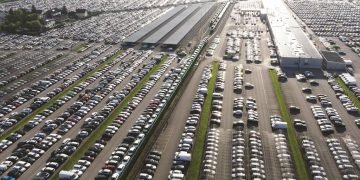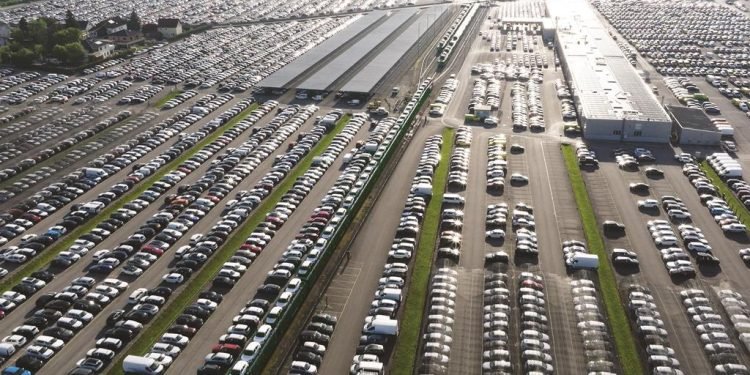By Eva Richardson – The Logistic News
March 31, 2025
As the countdown to the April 2 tariff deadline nears its end, automakers across the globe are racing to readjust logistics strategies, reroute supply chains, and prepare for what many consider a seismic shift in U.S. trade policy. The Trump administration’s decision to impose a 25% tariff on imported vehicles and automobile parts has reignited debate about industrial protectionism and raised urgent logistical questions for the automotive sector.
An Industry on Alert
With more than 50% of cars sold in the U.S. being imported — and up to 60% of parts in domestically assembled vehicles originating abroad — the new tariffs are poised to shake an already complex supply chain. Automakers have already begun to accelerate imports to beat the April deadline, a trend that has triggered congestion at key ports and placed air and ocean freight providers under pressure to meet last-minute requests.
Ford, Volkswagen, Hyundai, and Toyota are among the brands that have increased their inbound volume to U.S. ports over the past two weeks, as confirmed by recent customs and freight forwarder data. In parallel, warehousing hubs in Houston, Long Beach, and Savannah are witnessing an uptick in inventory volume, as manufacturers stockpile parts to mitigate the impact of expected cost surges.
Behind the Policy
The executive order signed by President Trump cites long-standing trade imbalances and unfair subsidies by foreign governments. According to the document, “the decline in domestic automotive production poses a risk to national security and weakens the industrial base.”
The tariffs apply broadly, though goods imported from USMCA (United States–Mexico–Canada Agreement) partners may be temporarily exempt if they comply with rules of origin standards. However, suppliers from Germany, Japan, South Korea, and China — all key exporters of auto parts — will be directly impacted.
Logistical Ripple Effects
The immediate effect on logistics is two-fold. First, transportation costs are set to rise, not only because of the tariffs themselves but also due to capacity constraints as automakers rush to bring shipments in early. Second, companies are being forced to rethink their just-in-time delivery models, long regarded as the industry standard.
“We’re already seeing clients pivot toward safety stock strategies and evaluating local warehousing options,” said Melissa Andrews, a senior supply chain strategist at a Detroit-based 3PL firm. “There’s also a renewed interest in nearshoring — Mexico is emerging as a strategic fallback for many Tier 1 suppliers.”
Air cargo providers are also adjusting. One freight airline operating out of Frankfurt reported a 20% spike in bookings for auto components heading to the U.S. between March 15 and 29, citing “urgent client requests” from German and Korean OEMs.
The Uncertain Road Ahead
Economists warn that the ripple effects may extend well beyond the logistics sector. A recent study by the U.S. Office of Economics suggests the new 25% tariffs could reduce imported vehicle volumes by nearly 74% and raise the average price of a new vehicle in the U.S. by 5%.
“These policies have long tails,” said Aaron Whitmore, a trade analyst with the American Chamber of International Commerce. “What starts as a tariff measure quickly turns into a cascading chain of adjustments across sourcing, logistics, pricing, and ultimately, consumer behavior.”
Final Thoughts
As of March 31, automakers and logistics providers are navigating one of the most uncertain trade environments in recent memory. While some view the new tariffs as a pathway to revitalizing American manufacturing, others see them as a catalyst for disruption.
One thing is certain: for the automotive logistics industry, agility, foresight, and adaptation will determine who thrives — and who stalls — in the months ahead.
Eva Richardson is a senior correspondent at The Logistic News, covering global trade and transportation trends. Her reporting focuses on the intersection of policy, technology, and logistics operations worldwide.























